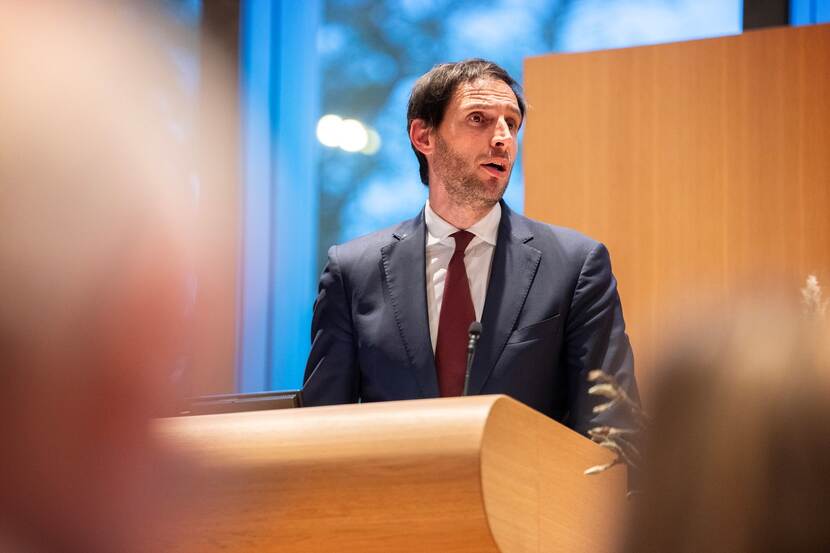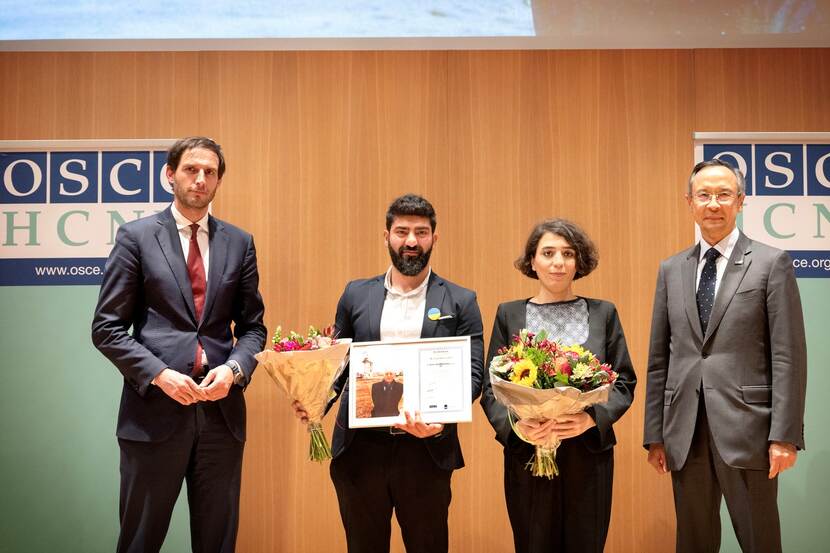Speech by Minister Hoekstra at the Max van der Stoel Award ceremony
Speech by Wopke Hoekstra, Minister of Foreign Affairs, at the Max van der Stoel Award ceremony, 24 November 2022.
Your Excellencies,
High Commissioner Abdrakhmanov,
Ambassadors,
Ladies and gentlemen,
‘The foundation of freedom, justice, and peace in the world.’
That is how human rights are described in the Universal Declaration.
Every member state of the United Nations subscribes to this document.
The entire international community agrees – at least officially – that we all possess an inherent human dignity, as well as equal and inalienable rights.
But simply declaring the existence of rights – however important – unfortunately does not make them a reality.
In order to enjoy our inherent rights and dignity, they must be upheld and enforced by a political community.
The philosopher Hannah Arendt famously called this gap between ideal and reality ‘the right to have rights’.
A gap that must be filled by citizens and civil society.
States are imperfect entities, as we all know, and they often fail to live up to the standards and obligations to which they voluntarily commit themselves.
That’s why it’s so important for citizens to hold their governments to account, and continue to insist that their inherent rights are recognised.
Civil society organisations simply have a crucial role to play in this regard.
They persistently advocate for social change and minority rights.
They advance public debate, and spur governments, including my own, to action.
They fight to make sure that people are not left behind, and that important social issues are not forgotten.
By doing all these things, NGOs form an essential bridge between the ideal of human rights, and the political act of making them a reality.
Therefore, it’s often the existence and vibrance of civil society that demonstrates the health and vitality of democracies and democratic institutions.
One simply cannot exist without the other.
This is the immense value of groups like the Social Justice Center, which we honour today.
It’s also part of the legacy of my predecessor Max van der Stoel, for whom this award is named.
He was the first Dutch Minister of Foreign Affairs to make human rights into a centerpiece of our foreign policy.
I am proud to say that, after he left office, we continued - and still continue – his legacy.
Today we find ourselves in the Peace Palace, a powerful monument to the ideal that right is stronger than might.
The Hague is home to numerous international courts and tribunals, for the same reason that our foreign policy stresses the importance of human rights.
We are a country that deeply believes in that fundamental part of the Declaration: that human rights are truly universal, and that we have a duty to help protect and advance them.
Every single day, and every time again.
This is particularly necessary in times of war, when the gap between ‘might’ and ‘right’ is greatest.
Russia’s unwarranted, unprovoked and illegal invasion of Ukraine is still ongoing.
Every day we’re confronted with evidence of war crimes, and atrocities committed against the Ukrainian people.
I witnessed some of the devastation first-hand, again, during my visit to Ukraine last week.
Once again, I’ve assured President Zelenskyy and Foreign Minister Kuleba of the Netherlands’ continued support.
In the form of arms, sanctions and humanitarian aid.
And it’s with deep personal conviction that I say: those responsible should be held to account, no matter how long it takes.
The Netherlands is pursuing a three-track approach to help achieve this.
First, we’re supporting the ICC in its investigations.
Second, we’re supporting the office of the Ukrainian prosecutor general.
And third, we’re looking at additional ways to investigate and prosecute international crimes. Through universal jurisdiction, and by consulting with our partners on the feasibility of establishing a special tribunal for the crime of aggression.
Several months ago, we hosted the Ukraine Accountability Conference here in The Hague, to help advance these three tracks.
The Conference’s message was as firm as it was clear: the world will not rest in the pursuit of justice.
We will continue on this path, even though we know it is long, and will be difficult.
Ladies and gentlemen,
In the 1940s, when the Second World War was raging on our continent, the American Reinhold Niebuhr wrote that ‘[our] capacity for justice makes democracy possible, but [our] inclination to injustice makes democracy necessary’.
Somewhat sad, but wise words.
I would like to add that it is our capacity for democracy that makes justice possible.
This is demonstrated every single day by the hardworking people of the Social Justice Center.
Their mission is to advance human rights and social justice. And to address the structural socioeconomic reasons for inequality.
They work for a more democratic Georgia, where all social groups and minorities are included: in politics, in the economy and in society.
They are an excellent example of why civil society is so essential to bridging the gap between the ideal and the practical reality of human rights.
They are actively helping to make Georgia’s judiciary more independent, accountable and impartial.
These efforts remain of fundamental importance, as Georgia works towards systemic and irreversible reforms in the rule of law.
The Netherlands is proud to support this progress.
The legacy of Max van der Stoel can be found anywhere people are willing to work towards a more just and dignified world.
He did this as a politician, as a government minister, as the first High Commissioner for National Minorities, and as a strong supporter of civil society organisations, and as a person.
It’s a wonderful thing that today we honour his legacy by celebrating the achievements of an organisation where all these strands come together.
I want to congratulate the Social Justice Center on winning this award!
It’s now my pleasure to invite their representatives, Ms Tamta Mikeladze and Mr Kamran Mammadli, to join me on stage to receive the award certificate.

